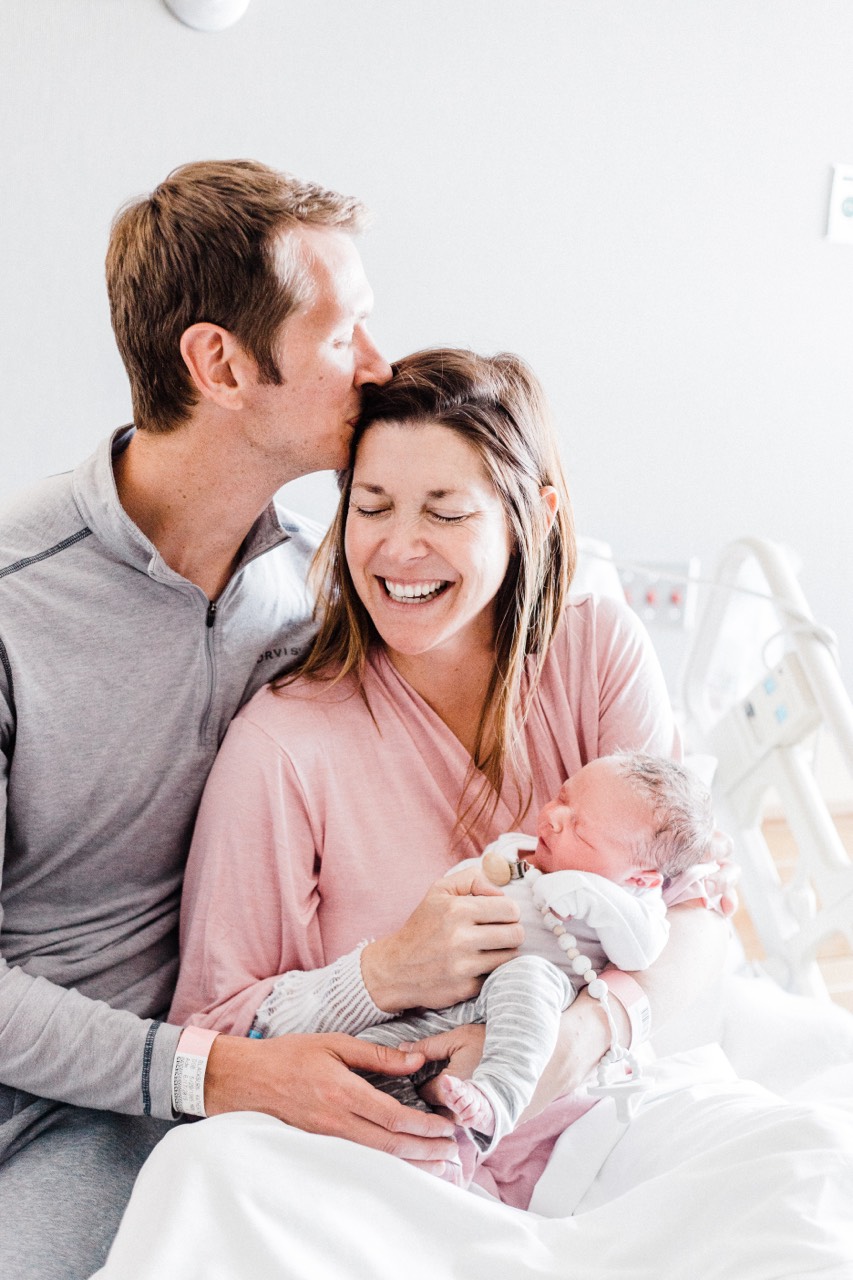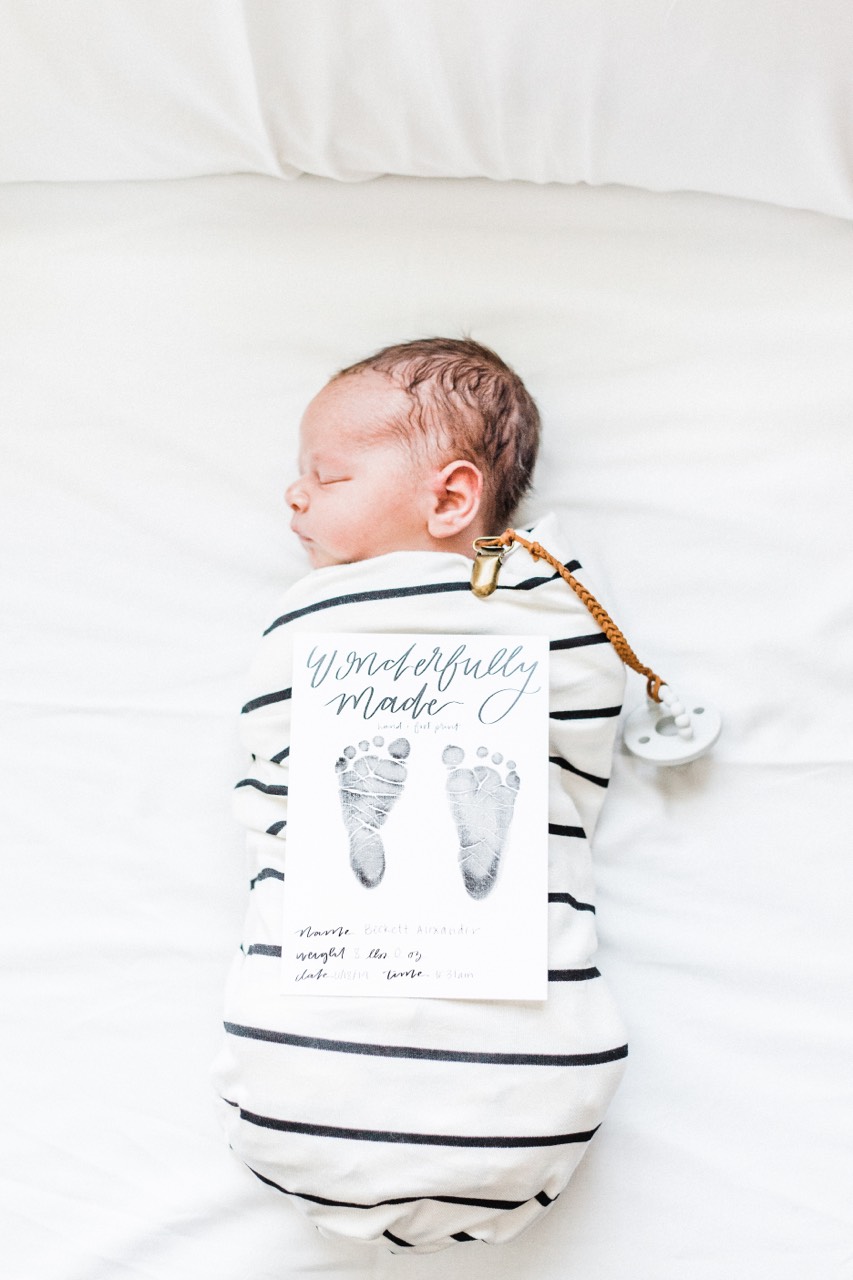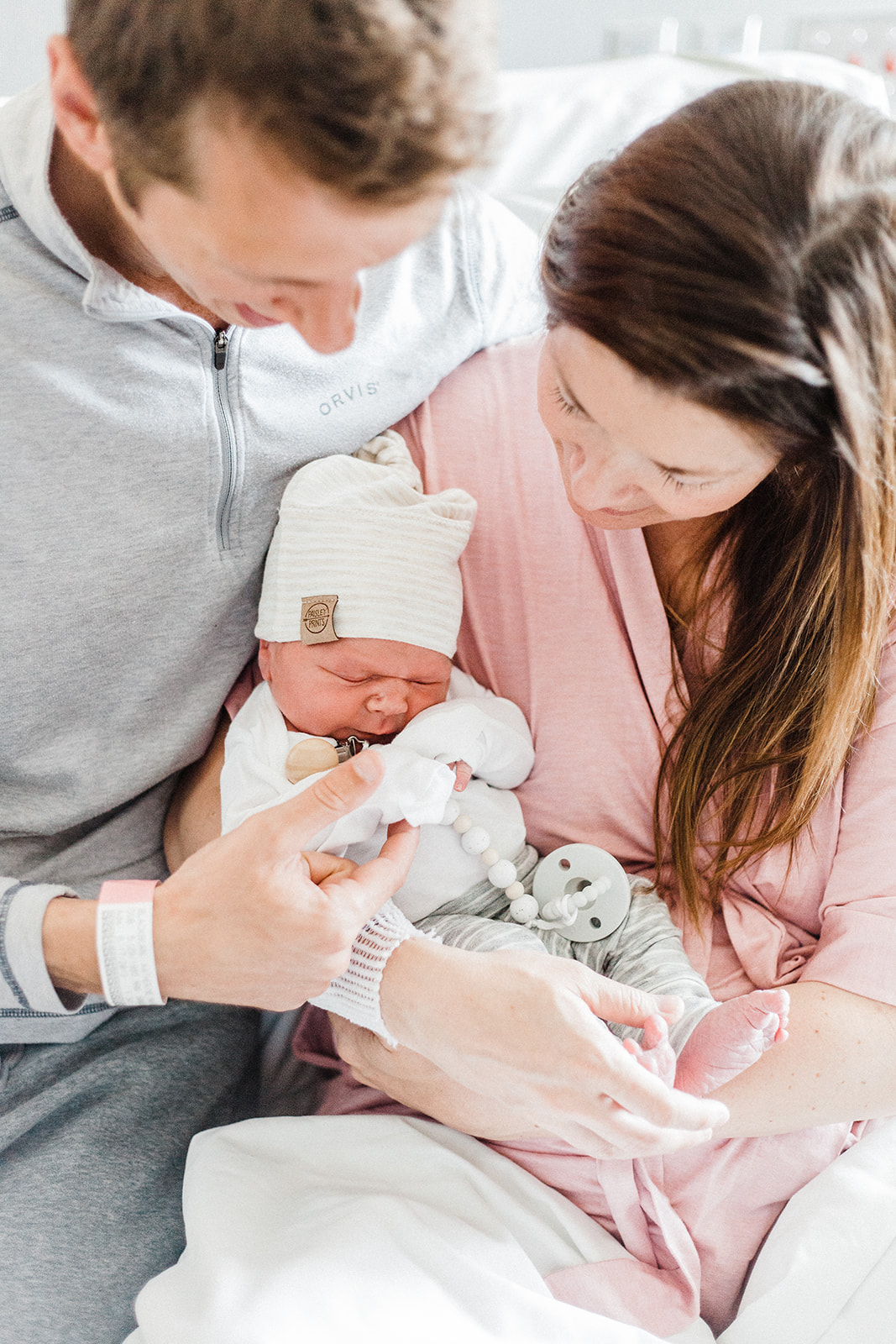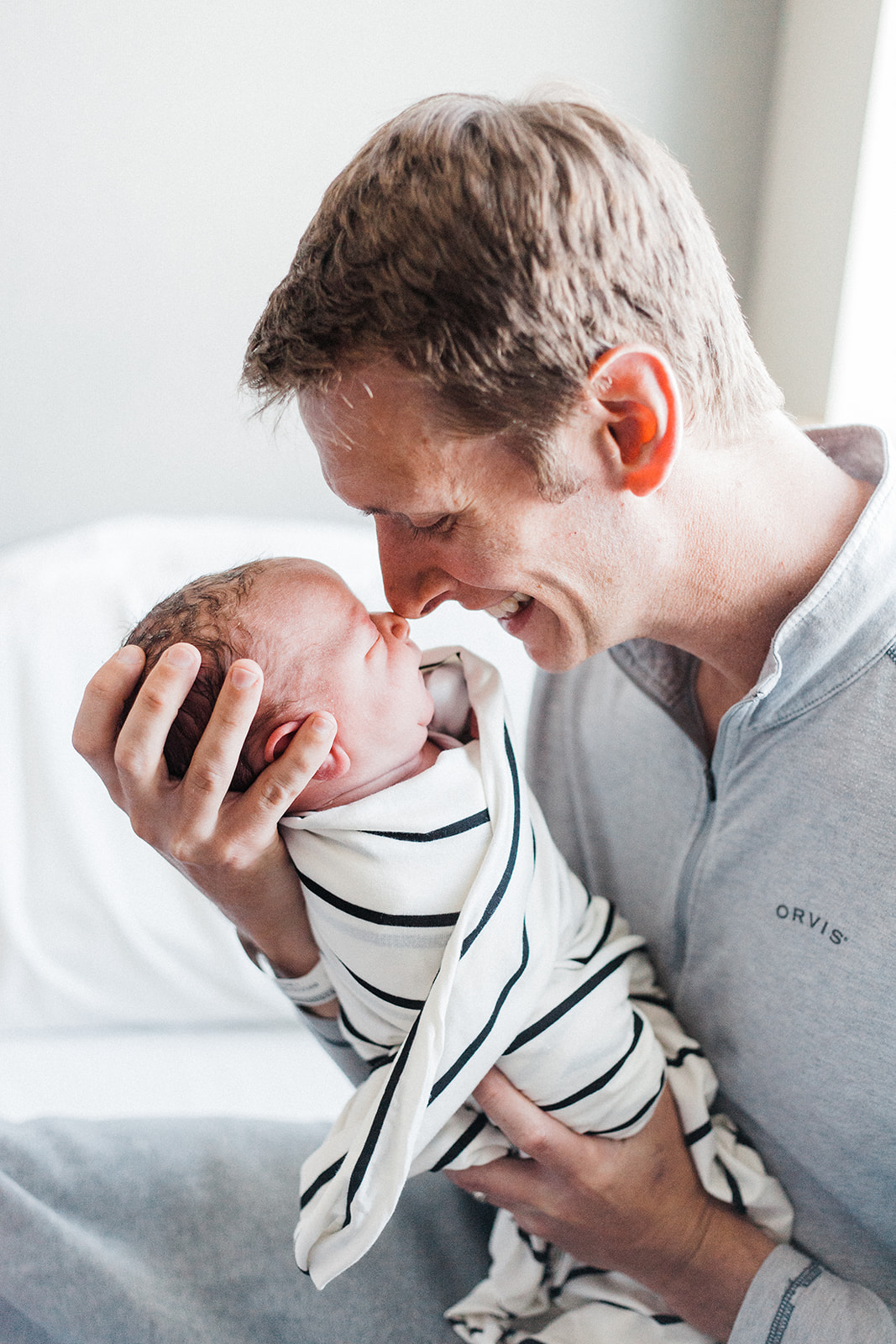I looked over my right shoulder to the clock on the wall, silently begging the passing hours to have the impact that my body was screaming out for it to have. It was just after 5:00am, a full 14 hours after the contractions became strong enough to force me to grab my husband and breathe in to his chest through each one.
“I’m going to check you again, Katie,” the midwife said. “Try to relax. Lots of pressure now.” She wasn’t lying.
I knew what she would tell me before she even made eye contact.
Still at 6 centimeters dilated. Baby’s head is still sitting back too far to put pressure on the cervix. A chorus of you’re so close, Katie, you can do this coming from the people around me.
In reality, six centimeters to ten is half the length of my pinky finger; really no distance at all to the naked eye. But after 14 hours, dozens of laps around the hospital, torturous labor positions intended to flip this baby boy from head up to head down, and the constant presence of one to two minute apart contractions that were doing the very job God gave them to do, that four centimeter distance felt like a hundred miles.
*****
I woke up on that Monday morning in much the same way I had woken up for the three weeks leading up to it: disappointed. My near nightly routine of a few hours of moderate contractions had stopped again, and we moved another day past my due date still very much carrying a baby. My body was the walking evidence of discomfort: the pregnant waddle, the swollen ankles and pulsing varicose veins decorating my right leg, the sore lower back that made sitting and standing a painful endeavor, the sleep interrupted to roll over or go to the bathroom or by the relentless hormones that make your mind wander for hours on end before they will let you return to rest. The last month of my fourth pregnancy was challenging in a physical and emotional way that my first three… just weren’t. And with four kids six years old and under to take care of - who wake up asking for milk and go to bed saying they need water - the minutes of the day were not exactly conducive to rest.
The day we got to the 37 weeks pregnant mark I started doing everything I could to get this baby boy moving. And I do mean everything. You cannot google a suggestion we did not try (well, except castor oil, because hard no for this mama). But I also had the mental comfort of precedence: my first baby came at 39 weeks 2 days, my second exactly at 39 weeks, and my third at 38 weeks. Surely, surely precedence mattered. This was the fourth time my body had thrown up and stretched and groaned and made room for a miracle; certainly it knew exactly what to do and with a little bit of help (read: control) from my great efforts, we would have a baby any day.
Hindsight forces me to chuckle here, as it took another 27 days for me to learn again, for the thousandth time, who the Author of Life is, and that while we are given many beautiful gifts in this life, control is not one we are mature enough to handle.
So after almost a full month of all the things, I woke up at 40 weeks and 5 days pregnant and forced a smile to my husband, who knew very well at that point that I prayed myself to sleep at night asking for a baby to come. “Let’s take the kids to the park today,” he suggested, “it’s so nice out and we all need to get some fresh air.” We loaded up the double stroller and four kids and headed a mile down the road to the park.
Are these contractions? I wondered as I sat down on the bench to relieve the throbbing in my right leg for a few minutes. I felt some significant cramping, but for a girl who started having contractions at 30 weeks pregnant, some cramping was nothing to be too excited about. I watched as our three year old ran through the splash pad with all his clothes on, totally free and happy and thrilled to be alive at a time that such human wonders like splash pads exist. I watched our five year old climb and slide and climb and slide again, having found the perfect balance of fun and challenge to keep him happy. I saw our six year old making new friends like she always does, her never met a stranger personality thriving more and more all the time. And I looked at our little foster girl as Alex pushed her on the baby swing, so full of joy as her little feet kicked as fast as they could - the body language of excitement speaking loud and clear. Then I felt more cramping, and as I watched my crew with sheer gratitude, I longed and prayed that our final recruit could join soon. And very soon.
Lord, let these be the beginning. Please, let these be the beginning.
Another mile walk home and four hours later, it was clear that God said yes.
*****
We checked in to the hospital around 6:30pm. I was 3cm dilated and 70% effaced with strong contractions two minutes apart. When the admitting nurse, Hannah, felt the baby’s position, she said, “You are definitely in labor, but it will progress much faster if the baby flips. Why don’t we send you home for a few hours and you can get on your hands and knees and hopefully help him to do that.”
With a defiance I do not normally have, I looked over at Alex, then to our doula, Sarah, almost as if I was gathering a bit of courage from them, then looked at Hannah right in the eyes and said, “No. I’m sorry, I cannot go home. I have four little ones at home who do not need to see me struggling through these contractions. And I have already been on my hands and knees three hours a day for a month. And I am 40 weeks and 5 days pregnant. I am not leaving here without a baby.”
Shortly after our midwife, Cyndi, walked in. Everything's better when the midwife gets there. She looked at the contractions on the monitor and immediately said to the triage staff, “Why doesn’t she have a room yet? She is in labor with her fourth baby - you really want to send her home like this?” Just before 9:00pm, we settled in to our corner room - me, Alex, Sarah and Cyndi, and within the hour joined by Kelly, my prayer warrior sister. And even though I had a natural birth with Jordi just 3.5 years ago, the next nine hours were unlike anything I’ve ever experienced.
The mission of both my doula and midwife became flipping the baby. Cyndi knew that once his head was down, he would be out in minutes. And if he didn’t flip, I could deliver him “sunny-side-up” too, but it would be harder and longer. Thus Operation Free Baby Blackburn began with sandbags. Two of them, actually, wedged between my belly and the bed as I lay as far over on my left side as I could. It was incredibly uncomfortable, but that was the whole point: get baby uncomfortable enough to roll over, too. This position helped increase the intensity of my contractions, but the baby did not budge.
Next up was the bath, but that was too relaxing and started to slow my contractions down. I was 5cm dilated by then, and I could not think about anything else besides having this baby as fast as we could, so we made the decision at midnight to break my water. As expected, the contractions ramped up quickly, and for the next five hours I was holding on to control for dear life and through the unspeakable torture of labor positions (and subsequent yelling, apparently mine, but I will deny it) intended to flip the baby - I will not give the visual here, and those who saw have sworn to take it to their grave. But I only held on that long because of the people in the room with me: my husband, my doula, my midwife and my friend - all coaching and supporting and rubbing my back and my head, physically holding me up at times, all encouraging and positive and all of them willing to pull an all-nighter to see this baby through.
But 5:00am came, and you know what happened: Still at 6 centimeters dilated. Baby’s head is still sitting back too far to put pressure on the cervix. A chorus of you’re so close, Katie, you can do this coming from the people around me. But I couldn’t think of anything but the pain, and the hundred miles my heart and mind, and mostly my body, felt from my baby.
*****
I think moments like this, when we just cannot see the finish line, are some of the hardest in life - at least the ones that require the most faith, even if you have to borrow it from others, and I certainly did. I like to live life with the end goal in mind, and I certainly like to see and be assured of an outcome that I can live with.
You would think after six and a half years of parenting, I would know that motherhood is not all that conducive to predictable outcomes.
Still, I wanted Beckett’s birth to be natural, a show of strength and perseverance for both of us. I wanted to see this through, but I couldn’t. 10 weeks of contractions. A month of I think I’m in labor moments. Four little ones at home whose mama had become so limited in carrying and holding and snuggling them. And finally, 14 hours of contractions plus five of truly the most intense physical pain I have ever been through, and I could not keep going. A hundred more miles was just too far. I cried out that I needed something - an epidural, a c-section, something to help, something to stop this pain, and I wasn’t even all that picky about it. It’s funny now to think about this moment, how I couldn’t see anything but needing a way out of where I was, how I had no idea that a hundred miles was really not a hundred miles at all.
We were just around the corner from where we wanted to be.
Somehow, my team talked me into the bath again. It had brought some slow down to the contractions earlier in the night, and the hope was that it would help me regain control of my breathing and crying (which was actually screaming). I cannot overstate the level of delirium setting in at this point. My arms and hands were shaking uncontrollably whenever I tried to hold my own body up - partly from the hormonal rush and partly from the total exhaustion of a sleepless night (which, I don’t exactly have a track record of - I almost wish I could have looked back on my college days and thought, “ah, no problem, we’ve done this a million times but alas, Katie Blackburn has been going to bed around 9:00pm for two decades and was woefully unprepared for the rigors of an all-nighter). Still, I got in the bath with my husband behind me rubbing and pushing on my back, and who - when he saw how far down I was falling into the water with each contraction, just went ahead and sat down fully clothed, cell phone and wallet in his pocket and all. He’s such a good man.
I stayed in the bath for about 30 minutes - no relief, no slowing down, nothing but my tears. At my request, my doula left the room to tell the nurse I wanted an epidural. The loudest thought in the world was I cannot do this one more minute and I would not hear anything else from anyone. When I got back to the bed the midwife asked, “Katie, I think I should just check you one more time, can I?”
“NO!” I firmly said back, as the anesthesiologist was wheeling his cart in to the room. “He hasn’t flipped, I haven’t felt anything. I’m still at 6, I know it. I can’t do this, I’m so tired. Please give me the epidural.” She took her gloves off, threw them in the garbage and said, “ok, hun.”
Maybe it was the knowledge that the sweet pain relief I thought was coming in the form of an epidural was minutes away - I could see it just feet from my bed. Maybe it was the warm water of the bath. Maybe it was the torture positions. I think it was mostly likely the desperate prayers of the people around me - but on the very next contraction, I felt my baby boy.
“Something is coming!” I yelled in a panic, mostly because in my delirium I still wanted the epidural. Something? There was really only one option, but I went with “something” in the moment. Cyndi immediately grabbed another pair of gloves and this time said above my protests, “Katie, I have to check you!” I cried, I begged her not to, begged time to stop so I could just get the pain relief, but we really were so close - even though I hadn’t believed it.
“Katie, you are complete and your baby is right here. You have to push!”
“I can’t!”
“You have to!” came from four people in unison. And out of the corner of my eye I saw the anesthesiologist wheel his cart right back out of the room as three more Labor & Delivery nurses rushed in. Alex grabbed my head and said, “You can do this, Katie. Take a breath and tell me you can do this.”
“I can. I can do this.”
With truly every bit of strength I could find, I pushed and felt his head, then his torso, and then, I felt almost weightless. Beckett’s little body came out in under a minute, his head turned down just in time, and the sweetest relief in the world washed over both of us as they put him directly on my chest at 6:31am. The distance between 6 and 10 centimeters closed just as fast as Beckett could turn over.
That moment, y’all. I don’t even have words, just gratitude.
*****
The past year has been a walk through big and unexpected and wonderful things for our family. I’ve been confident and I’ve lacked faith. I’ve felt great and I’ve had days when I could hardly get out of bed. I’ve been self-sufficient and I’ve needed more help than ever. But mostly, I’ve been so humbled by how little I know, and grown more and more thankful for a God that knows all things, and who holds all things together - including Beckett Alexander. And Harper Kristin, Cannon Lee, Jordi Daniel, and a little nine-month old girl who has found her way deep into our hearts - what amazing grace that assurance is. Motherhood has taught me so much in the short six and half years I have had the profound privilege of raising children, but I have the feeling the lessons are only beginning.
I will never, ever forget what an amazing support my husband was through every minute of Beckett’s birth. I will always remember the calming presence of my doula, the confidence of my midwife and the way Kelly came over and rubbed my hair when I was out of steam without even being asked. And when I look at my sweet Beckett, for his entire life I will never forget that he came in to the world when I was at my very weakest, when the distance was just too far for me to make it - and that’s when the miracle happened. Beckett is living proof that God’s power is most perfect when we have nothing to offer, and I think that might be exactly what I am supposed to remember.














